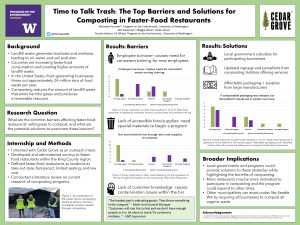Time to Talk Trash: The Top Barriers and Solutions for Composting in Faster Food Restaurants
With the growing consumption of faster-food in King County, the surrounding landfills are filling quickly and releasing large amounts of methane and carbon dioxide into the atmosphere. With a successful composting program implemented, food waste can be diverted from landfills, helping both public and environmental health. The aim of this study is to identify the barriers and solutions of composting in faster-food restaurants to help implement more successful composting programs. The research was conducted through the distribution of a 33-question survey by email, phone, and in-person outreach that was completed by 21 composting and non-composting restaurants throughout King County. To collect more evidence to support the survey results, a literature analysis was completed to draw comparisons to similar data in other cities and counties with comparable populations and regulations to King County. The key findings show that the most prominent barriers are the lack of knowledgeable customers, the need for regular staff training on waste sorting, employee turnover, and the lack of accessible bins, supplies, and updated signage. The most prominent strengths exhibited for both composting and non-composting restaurants include an environmentally friendly image for the store/district/company, cost savings, knowledgeable staff, and reduced environmental impact. This research can facilitate work between composting facilities and local governments to devise methodologies that will assist faster-food restaurants in surmounting barriers to composting. Furthermore, it aims to promote the benefits of composting to commercial entities and decrease the negative environmental effects.
